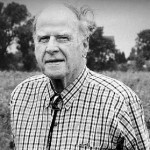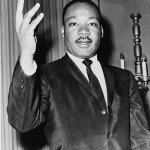On the first Earth Day, April 22, 1970, its founder, Senator Gaylord Nelson, spoke in Denver, Colorado:
Earth Day can — and it must — lend a new urgency and a new support to solving the problems that still threaten to tear the fabric of this society . . . the problems of race, of war, or poverty, of modern day institutions.
. . . Our goal is not just an environment of clean air and water and scenic beauty. The objective is an environment of decency, quality and mutual respect for all other human beings and all other living creatures.
Senator Nelson’s words echoed poignantly the emergent ethic of the time, which many of us have forgotten: justice cannot be meted out in isolated doses, issue by issue; respect and decency are a pervasive and common right.
Reverend Martin Luther King, Jr. believed in an ecology of justice, an inviolable web of moral interdependence that connects us all. On May 1, 1963, he wrote the Letter from Birmingham City Jail to address charges by other clerics that he was a mere agitator:
Injustice anywhere is a threat to justice everywhere. We are caught in an inescapable network of mutuality, tied in a single garment of destiny. Whatever affects one directly, affects all indirectly.
In a conversation with EarthDesk, folksinger, environmentalist and activist Pete Seeger said:
After all these years, it is still the case that we fight “strangeness” – the fear of anything different — to protect “our own.” But the larger ideal of respect and decency for all must be the backbone of any movement, the environmental movement included.
There are times we must pause our more typical environmental concerns, such as climate change, the global water crisis, and the fate of other species, to consider what we humans require of, and owe to, the members of our own specie; to reflect upon the adequacy of our social institutions at-large, as the original vision for Earth Day demanded.
The Supreme Court decision overturning the Defense of Marriage Act is a victory for the larger ideal of which Pete Seeger spoke, and the ecology of justice in which Reverend King believed. It reaffirms the “environment of decency, quality and mutual respect for all other human beings” that Senator Gaylord Nelson called upon us to embrace.
The DOMA decision is a reminder that Senator Nelson’s message on that first Earth Day is relevant still. Caring for the planet is not about “just an environment of clean air and water and scenic beauty.” It is also about caring for each other.




I really like your framing of justice as part an ecology. It’s human systems we talk about anyway, whether it’s social or environmental justice.
A piece of justice that didn’t work in the favor of African Americans is the Voting Rights Act being overturned. I wish it were such that racism itself were gone. There has been a feeling brewing of “pull up the ladder” in the US, as if there is not enough to go around. Fostering a sense of plenty might help others feel less afraid, and as such, more generous. This may be an economical issue that is rooted in our complex and skewed financial system too. I don’t know enough to know, only to speculate.
Thanks, Maria. I agree. My keenest interest is in fact human systems, and the role and future of humans on the planet.
This is a nation of plenty. It is also a nation where a few hoarders, and demagogues, can cause terrible injustices to the many. I think of Americans as a charitable people, though, mostly motivated by the right things. Sometimes it takes us a few, sometimes it takes us many, generations to see the obvious staring back at us. I believe we are locked into finding, and demanding, justice within the system we have inherited. And so I take courage in another great adage from Reverend King: “The arc of the moral universe is long, but it bends toward justice.”